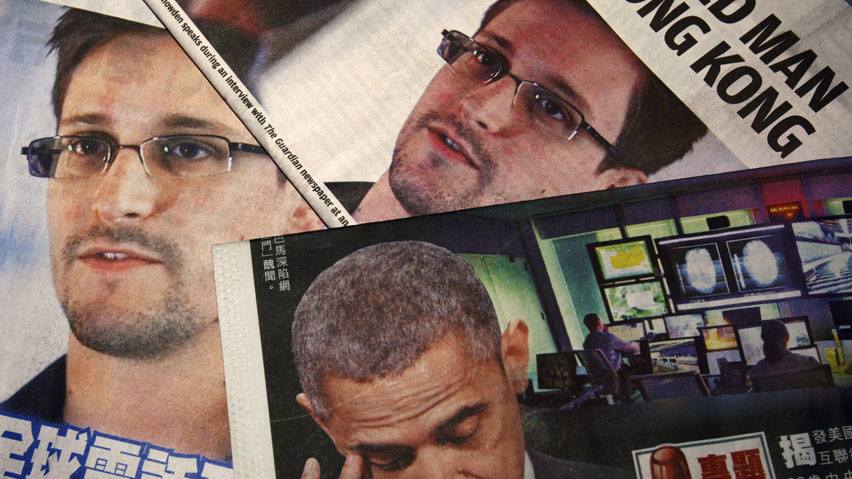Revelations of a classified program by the National Security Agency to collect data in the U.S. has prompted outrage as well as denunciation from the left and right.
Many are under the impression that the Obama administration has been eavesdropping on phone calls and reading private emails. And comparisons to George W. Bush’s abusive, post-9/11 surveillance policies have abounded.
But the details of this particular program are far more innocuous than the media has portrayed. And the suggestion that it rises to the level of intrusiveness and illegality seen during the Bush years exposes the profoundly short memories of political observers, and a fundamental lack of perspective when it comes to the current policy.
| Whistleblowers reveal illegal activity so abusive and secretive that it completely circumvents the safeguards inherent in our system of government. Edward Snowden is no whistleblower. |
Back in the spring of 2004, while Attorney General John Ashcroft was hospitalized for emergency gallbladder surgery, Bush’s Chief of Staff and White House Counsel slipped into his hospital room at night, and in the hope that Ashcroft was too incapacitated to know better, they attempted to trick him into reauthorizing a warrantless wiretapping program that the Justice Department had already deemed illegal. The acting Attorney General, James Comey, was so concerned when he was tipped off about this, that his security detail sped him to the hospital, and the Director of the FBI ordered the Secret Service personnel guarding Ashcroft to make sure Comey did not leave his side. Ashcroft, more lucid than the White House had anticipated, refused to sign the documents, and then vowed to lead a mass resignation in protest of what he, Comey, and FBI Director Bob Mueller viewed as a flagrantly unconstitutional program. Bush eventually cooled things down by agreeing to alter the program.
The policy fueling today’s cartoonish hysteria bears only a vaguely nagging resemblance to the memories of government surveillance under Bush. First, this is nothing new. The program has been around for about seven years, and congress has repeatedly been briefed on it and has voted to reauthorize it. Both respective chairs of the House and Senate Intelligence Committees, conservative Republican Mike Rogers, and liberal Democrat Dianne Feinstein, have been aware of the program, insist their colleagues have been aware of it, and they both strongly support it. Even liberal stalwarts like Sen. Al Franken have defended the program.
Second, and most important, unlike the activities of George Bush, the Obama Administration is not engaging in warrantless surveillance. Phone calls are not being recorded or listened to. Emails are not being read. The only data being collected is basically that Phone Number A called Phone Number B, and for how long. Names are not associated with that information, but even that data collection requires a warrant. If the government then sees suspicious patterns that they’d like to investigate deeper, they then have to go back to court, provide probable cause, and secure a separate warrant.
| Leaking classified information to expose a policy you don’t happen to agree with isn’t heroic martyrdom — it’s just a flat-out crime. |
And finally, Congress has had multiple opportunities to inject more transparency into the NSA’s surveillance activities. Just last December Republicans (some of whom are now criticizing the White House) voted down several such provisions, including one that would have declassified the specific program now at the heart of the furor.
This doesn’t mean the White House should get a free pass on these types of privacy and surveillance issues. Historically, when it comes to utilizing surveillance in leak investigations for example, the White House has overstepped. Whistleblowers serve a very important purpose, and Obama has deserved criticism for his overly aggressive action in trying to silence them.
But Edward Snowden, the intelligence contractor who leaked this NSA story, is no whistleblower. Whistleblowers reveal illegal activity so abusive and secretive that it completely circumvents the safeguards inherent in our system of government. This program, for good or ill, is legal. And congress knew about it and has had numerous chances to either squash it or change it. Leaking classified information to expose a policy you don’t happen to agree with isn’t heroic martyrdom; it’s just a flat-out crime that undermines more constructive opponents of the government overreach the country has endured since 9/11.
The reality of representative government is that not all issues will be publicly debated. That’s why judicial and congressional oversight is so important. Snowden’s defenders insist his actions were necessary to encourage an important debate. But for years the American people sat back and idly watched as their constitutional right to privacy was violated under the policies of George Bush, and they never welcomed such a debate.
If the country has suddenly rekindled its long-dormant appreciation for the Fourth Amendment, that broader discussion should be focused on more serious fronts, not on a completely overblown, misunderstood data-collection program. For all the hand-wringing over this NSA activity, private companies accumulate far more intrusive personal information, and they’re not subject to any legal oversight.
Snowden has warned of the horrors of living in a society that doesn’t respect the privacy of its citizens. Now he’s hiding out in China. Good luck with that.
Doug Daniels is a former staff reporter for Campaigns & Elections. He is the author of the forthcoming memoir Sifting Through the Wreckage. (Image via)




0 Comments